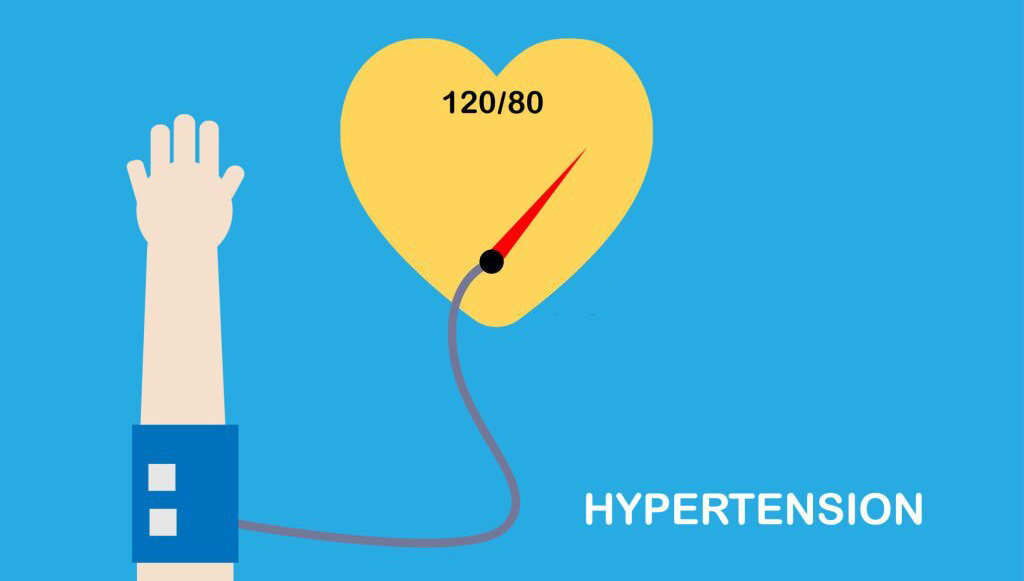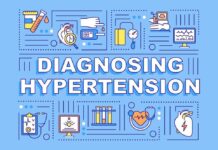In layman's terms, millions of people are affected by hypertension (or high blood pressure) worldwide. While this condition is more common among older adults – approximately 30% of American adults have higher than average blood pressure – even teenagers and children can be affected.
It is one of the leading contributors to heart disease but, luckily, can also be easily recognized and tracked through annual physical checkups. If you have consistently high blood pressure, then you should take steps to manage your heart health.
What is High Blood Pressure?
High blood pressure is the most common type of heart disease caused by the buildup of calcium or plaque in your veins. This buildup, in turn, causes your heart to work harder than would otherwise be necessary to supply blood to the rest of your body.
Though it is typical for your blood pressure to increase immediately after physical activity or in times of stress, a consistently high value is typically a sign that the condition needs to be treated.
Extended periods of hypertension can deteriorate the condition of your arteries over time, as well as lead to potential strokes or heart attacks. In addition to more common impacts on overall heart health, high blood pressure can also lead to damage to the kidneys, eyes, and brain.
The severity of high blood pressure varies. In an effort to be more proactive about treating heart disease, doctors now identify “at risk” patients who regularly record blood pressure values slightly higher than average.
However, this condition does not typically manifest with noticeable symptoms, and adults who do not regularly visit a physician may not even know that they have it.
Common Treatments for High Blood Pressure
Most physicians will first recommend making some lifestyle changes to reduce high blood pressure. However, if those changes do not yield tangible improvements, or if you have a family history of heart disease, your doctor may prescribe one of the following types of medication:
- A diuretic to help your body filter out salt from your system
- A beta-blocker to make your heart beat slower
- ACE inhibitors, calcium channel blockers, or ARB blockers that relax your blood vessels
These medications are typically prescribed one at a time, but your physician may recommend that you take two simultaneously in severe cases.
Common Side Effects of Blood Pressure Medication
Prescribed medications can be an effective way to decrease your blood pressure. However, as with most commercial treatments for illness, blood pressure medications come with a bundle of common side effects:
- Dizziness
- Erectile dysfunction
- Frequent urination at night
- Fatigue or drowsiness
- Increased sensitivity to cold or sunlight
- Weight fluctuation (unrelated to lifestyle changes)
- Nausea or vomiting.
Costs of Prescribed Medications
Another downfall of prescribed medications is that they are expensive. Patients without health insurance could pay upwards of $400 for medications alone.
Even insured patients are required to pay co-pays and co-insurance charges for treatment. Add that to the cost of doctor's visits, blood work, and additional heart disease screenings, and the costs add up quickly.
How to Lower Blood Pressure with Natural Remedies
Most physicians begin treatment of high blood pressure with lifestyle changes to avoid prescribing medications if they can be avoided.
This is because blood pressure can be controlled without introducing unnatural agents into your system unless the condition has progressed to a level of severity that lifestyle changes cannot sufficiently address.
Medications can have harsh effects on your body's natural cycle. The most common side effects listed above are not inherently dangerous, but they are incredibly uncomfortable and unnatural to your body's rhythm.
Rather than subjecting yourself to a rash of side effects, you could try a home remedy that could produce the same results without all of the chemicals and side effects of prescribed medications.
But What About My Doctor?
Home remedies utilize natural ingredients and, when used correctly, should not introduce unintended consequences.
However, you should inform your doctor if you intend to try a natural solution to reduce your high blood pressure. It would be best if you never substituted such treatment for a prescribed medication against your doctor's advice.
6 Home Remedies for High Blood Pressure
There are many natural remedies for high blood pressure that work just as well as prescription drugs. In fact, many doctors recommend these alternative treatments over medication because they are safer and cheaper.
We've compiled a list of the top 6 most effective home remedies to lower high blood pressure. They include foods, herbs, spices, oils, and teas. These remedies will help lower your blood pressure without any side effects.
1. Brew A Cup of Hibiscus “Tea”
Consistently drinking a cup of hibiscus tea each day is a fantastic way to decrease your blood pressure.
In fact, a study completed as a part of the PREMIER Clinical Trial demonstrated that having two cups with breakfast each morning was as effective at lowering blood pressure as some prescribed medications.
Drinking a cup of tea with each meal lowered blood pressure by an average of 7 points, which led to a notable percentage drop in the likelihood of dying from stroke, heart attack, or other heart diseases.
Hibiscus has diuretic properties, which can help to remove salts from the bloodstream, decreasing the stress on arteries and veins. It also mimics the properties of ACE inhibitors so that it can relax tension in the veins to lower blood pressure.
Directions: Boil one cup of fresh water and add 1-2 teaspoons of dried hibiscus. Steep for at least five minutes. If desired, you can stir with a cinnamon stick or add honey or lemon juice to taste. Drink 2-3 times each day, or with meals, to produce optimal effects.
2. Use Valerian Root Essential Oil Topically or Aromatically
Valerian is a plant with a unique scent and powerful sedative effects. Its essential oil, harvested from the plant's root, is safe to use either topically or aromatically to produce a number of beneficial effects on the body.
Valerian essential oil has two effects that can stave off high blood pressure.
First, it has the power to deeply relax the nervous system, thereby acting as a sedative to combat tension, stress, and anxiety. This offsets hypertension by reducing the emotional factors leading to high blood pressure.
Second, many users have noted that continued use of valerian oil can reduce the onset of heart palpitations, hyperactivity, and insomnia, all of which can contribute to the onset of high blood pressure or other heart diseases.
Directions: To use topically, massage 2-4 drops into the back of your neck or the soles of your feet. Valerian essential oil is safe to use undiluted. Still, if you have sensitive skin, you may want to consider diluting with a non-greasy carrier oil (such as coconut or avocado oil) to reduce the risk of skin irritation.
To use aromatically, add 2-3 drops to a diffuser of your choice and diffuse for up to 30 minutes. You can repeat this process up to three times each day.
3. Drink Coconut Water
Coconut water has dozens of health benefits: from helping you to achieve radiant, glowing skin to make it easier to lose weight.
This drink is packed with vitamins, antioxidants, minerals, and enzymes that can lead to anti-cancerous, anti-aging, and immune-system-boosting effects.
Potassium and magnesium are just two compounds found in coconut water, and they help regulate muscular function. Since your heart is a muscle, it can also help to reduce strain caused by high blood pressure.
Potassium is also good for relaxing the nervous system, which can help to prevent your blood pressure from escalating. Its high antioxidant count also helps improve your cardiovascular system's overall health.
Directions: Just drink a full glass (8 ounces) once or twice each day! It's that simple. The morning would be best if you choose to drink it only once.
4. Add Fish Oil to Your Diet
Fish oils contain omega-3 fatty acids that your body does not produce on its own. These healthy fats have been linked to a number of positive effects on overall brain, heart, joint, and overall bodily health.
Fish oils are typically found in fatty fish such as mackerel or salmon and less intuitive foods such as flaxseeds and nuts. Incorporating these types of foods into your diet two or three times a week is one way to ingest more omega-3 fatty acids, and most medical practitioners recommend using this method to increase your intake.
However, some find it easier to take a fish oil supplement instead.
Directions: Eat foods with a high omega-3 fatty acid content, such as fish or nuts, at least 2-3 times each week. This will increase your intake of beneficial fish oil compounds as well as the other healthy proteins and vitamins contained in those foods.
Alternatively, you can take one fish oil supplement capsule each day or add liquid fish oil to a glass of orange juice (with the approval of your physician and following the dosage recommendations and instructions on the bottle).
5. Start Your Day with A Melon
Watermelon is a summer staple at barbecues and picnics throughout the season.
This fruit has a number of health benefits; its high water content – is 92 percent! It helps kids and adults stay hydrated in the hot summer sun and is loaded with vitamins, antioxidants, lycopene, and amino acids.
In addition to being generally delicious and nutritious, watermelon contains an amino acid compound called citrulline that helps your body to regulate cardiovascular function.
This compound sets off a chain reaction throughout your body that ultimately results in the production of nitric oxide. Nitric oxide helps to relax your blood vessels, allowing blood to flow through your system under a more healthy pressure and helps your body to control how strongly your heart pumps blood through the bloodstream.
Directions: Eat 1-2 slices of fresh watermelon each morning for breakfast. Sliced or diced makes no difference – eat it however you prefer! Just be sure not to add any additional sugar or salt. Effects will be more pronounced if you eat your watermelon on an empty stomach.
6. Use Marjoram Essential Oil
Marjoram essential oil is derived from the leaves of the marjoram plant, which is native to the Mediterranean region. It has been used medicinally for decades as a result of its many health benefits.
Its use can reduce discomfort associated with common ailments such as headaches and colds, decrease the risk of infection in cuts and scrapes, and stave off the growth of fungi to more easily address fungal infections.
Several of marjoram essential oil's versatile health benefits contribute to its ability to decrease blood pressure. Its use can:
- Improve circulatory function
- Remove excess salts from the body
- Increase urination
- Alleviate stress and anxiety
- Relax blood vessels to ease blood flow
Any of the above qualities can individually reduce high blood pressure. The combination of these effects makes marjoram essential oil a powerful natural combatant to hypertension.
Directions: Marjoram essential oil can be used topically, internally, or aromatically.
For topical use, dilute 1-2 drops with a carrier oil (such as coconut or avocado oil) and massage into the skin.
To use internally, add 1 drop of oil to 4 ounces of another liquid and drink.
For aromatic use, diffuse 3-4 drops in a diffuser of your choice.
Conclusion
High blood pressure is incredibly common heart disease, affecting almost 1 in 3 adults in the United States. Only about half of those afflicted with high blood pressure adequately maintain their condition or actively reduce their risk of heart attack or stroke.
Lifestyle changes (improving diet and exercise habits) are always the best first step to trying to bring your blood pressure back to a normal level.
However, if these steps don't work, using one of these natural remedies for high blood pressure could help you to address your hypertension without introducing unnatural chemicals into your body or incurring unnatural and uncomfortable side effects such as nausea, dizziness, or fatigue.
Many of these remedies have health effects outside of the benefits to your heart health, and none come with a laundry list of negative side effects.
Before turning to prescribed medications, try one of these six home remedies for high blood pressure as a natural alternative to expensive commercial medications.






